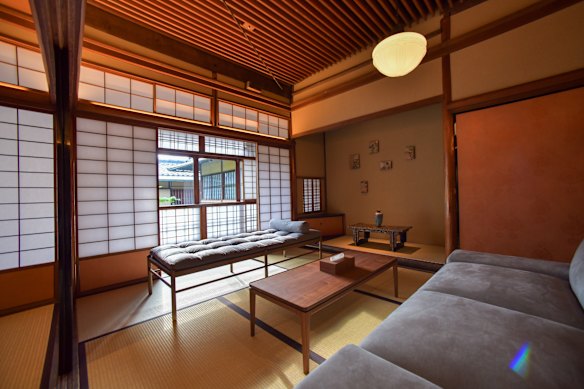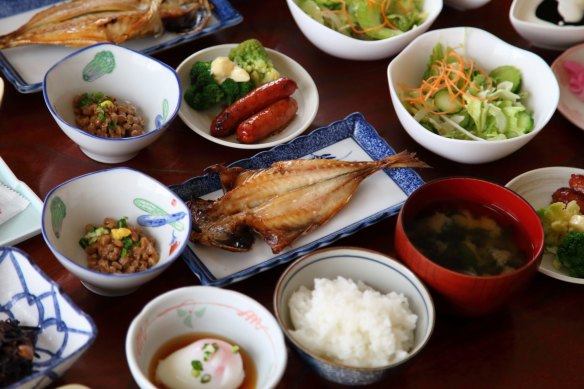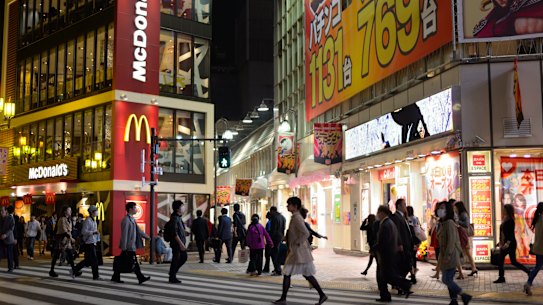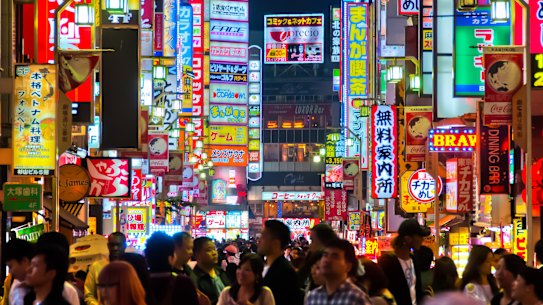October 22, 2025 — 4:00am
Save
You have reached your maximum number of saved items.
Remove items from your saved list to add more.
Save this article for later
Add articles to your saved list and come back to them anytime.
Got it
It doesn’t matter whether you like the food or not. I mean, you should like it, but that’s not the point.
The point is the cultural experience. The point is that you’re staying at a ryokan, which offers the chance for the sort of cultural immersion that is rare in this world of mass tourism and performative traditions.
A Japanese ryokan is not just a place to stay, it’s a place to be. These are often historic establishments, places that take you back to an almost forgotten time in Japan, where guests wear yukata, the traditional robes, where they soak in onsen baths morning and night, they sit and sip tea and appreciate the beauty of gardens or mountain views, they sleep on futon mattresses laid across tatami floors, and they eat sprawling feasts of classic, local food.
 Sowaka ryokan in Kyoto.
Sowaka ryokan in Kyoto.
There’s nothing else in the world like a ryokan. Nowhere that I have visited offers the chance to indulge in a foreign culture in a way that is so completely organic and real. This isn’t done for performance, it’s done for the joy of keeping culture alive, both for Japanese people and for overseas visitors alike.
A ryokan is one of travel’s great pleasures; one of its great privileges. So why, oh why, are foreign guests now staying there and demanding to eat western food?
I discovered this a few weeks ago at an event put on by Hoshino Resorts, an accommodation company in Japan with brands such as Hoshinoya, OMO, and Kai. I’ve stayed as a guest of Hoshino at a few different properties, so I know those brands well.
 Japanese ryokan breakfast dishes include cooked white rice, grilled fish, boiled egg, miso soup, natto, and pickled vegetables.iStock
Japanese ryokan breakfast dishes include cooked white rice, grilled fish, boiled egg, miso soup, natto, and pickled vegetables.iStock
At this recent event, company representatives spoke about the changes and improvements Hoshino has been making at its various properties, and one of these related to Kai, the company’s string of high-end ryokan-style resorts. To cater better to foreign tourists, they said, their ryokans are now offering the option of western-style breakfasts, rather than a traditional Japanese spread.
You can’t blame Hoshino for this. A good hotel gives customers what they want – and clearly, there is a demand out there for bacon and eggs when clients get up from their futon bed, not grilled salmon and rice. The customer is always right.
In this case though, the customer is wrong – what are you thinking? To choose a western breakfast at a ryokan is a colossal mistake, a denial of one of travel’s great pleasures.
I get that breakfast is a tricky thing for a lot of western travellers. We’re all keen for culinary exploration at lunch and dinner – most travellers will dive into a wide array of local foods in the middle of the day or the evening. But breakfast is different.
You’re missing one of the world’s great meals, a spread of fish, rice, pickled vegetables, braised tofu, sheets of nori, miso soup.
People tend to want comfort and familiarity at breakfast. It’s not so much laksa or nasi lemak, or ful medames or pho, but more bacon and eggs, or toast and jam. Exploration can begin at about 10am.
I realise that’s a thing, so I understand the desire to go for familiar, safe western ingredients when you sit down to your set-menu breakfast at a Japanese ryokan.
But still, it’s wrong.
To start with, you’re missing out, culinarily. You’re missing one of the world’s great meals, a spread of fish, rice, pickled vegetables, braised tofu, sheets of nori, miso soup. There might be natto too (sticky, fermented soy beans), which will be more of a challenge, but still worth a try.
Please don’t give that up in favour of eggs on toast.
Related Article
But more importantly, you’re missing out culturally. You’re wearing a yukata, you’re sleeping on a futon, you’re existing in this richly traditional environment. Why wouldn’t you extend that to the food?
This demand for a familiar breakfast speaks of a larger desire, I think, to mould the travel experience into something that makes us feel comfortable. It’s a demand that somewhere so traditional as Japan, and somewhere so classic and typically rigid as a ryokan, bend to the wishes of foreign visitors.
It doesn’t speak well of us. Travel is supposed to be about experiencing something new, something different. It’s supposed to be about going to someone else’s country and seeing how they live, and living that way as well.
Related Article
But there’s another style of travel that prioritises personal comfort over local culture, that demands conformity from its hosts. It centres the traveller instead of the destination, it makes the visitor more important than the visited.
It’s this person who would see a spread of Japanese food – local, seasonal, traditional food – being lovingly prepared and painstakingly plated and then served at the beginning of the day in luxurious surroundings and ask: hey, do you have anything else?
Sign up for the Traveller newsletter
The latest travel news, tips and inspiration delivered to your inbox. Sign up now.
Save
You have reached your maximum number of saved items.
Remove items from your saved list to add more.
![]() Ben Groundwater is a Sydney-based travel writer, columnist, broadcaster, author and occasional tour guide with more than 25 years’ experience in media, and a lifetime of experience traversing the globe. He specialises in food and wine – writing about it, as well as consuming it – and at any given moment in time Ben is probably thinking about either ramen in Tokyo, pintxos in San Sebastian, or carbonara in Rome. Follow him on Instagram @bengroundwaterConnect via email.From our partners
Ben Groundwater is a Sydney-based travel writer, columnist, broadcaster, author and occasional tour guide with more than 25 years’ experience in media, and a lifetime of experience traversing the globe. He specialises in food and wine – writing about it, as well as consuming it – and at any given moment in time Ben is probably thinking about either ramen in Tokyo, pintxos in San Sebastian, or carbonara in Rome. Follow him on Instagram @bengroundwaterConnect via email.From our partners


AloJapan.com